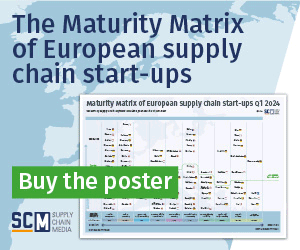Bram Desmet: ‘‘Supply chain professionals must understand ROCE’’

How can supply chain professionals cast off their inferiority complex? By gaining a precise understanding of how supply chain contributes to the profit and not just the costs, according to the recent book by Bram Desmet. In it, he links the corporate strategy to the supply chain and financial performance indicators.
By Martijn Lofvers
Bram Desmet is CEO of software vendor Solventure and also Adjunct Professor Operations & Supply Chain at Vlerick Business School. He recently published a book titled Supply Chain Strategy and Financial Metrics: The Supply Chain Triangle of Service, Cost and Cash. Supply Chain Media talked to him to find out more.
Why did you write this book?
“To share what I’ve learnt over the past 15 years. The biggest surprise was that even though the supply chain triangle comprising service, cost and cash is so simple and intuitive, so many companies are still struggling to strike the right balance and they find it difficult to make the right strategic choices. I’ve visited many companies, but over the past five years I’ve only come across this triangle in practice at P&G and at 3M, and even then the impact on finance was not clear and there was no link to strategy. The supply chain triangle comprises Sales, which is revenue- and service-driven, Operations which is focused on costs, and Finance which is concerned about cash and cashflow, with inventory being a crucial element of that. Rather than departments agreeing on trade-offs and making decisions together, it often ends up in a tug of war within many companies.”
Who is this book aimed at?
“First and foremost, it’s aimed at supply chain professionals. They often adopt a subordinate attitude, such as when the strategy is being discussed. The commercial strategy is usually regarded as leading and Supply Chain just has to solve the resulting issues as best they can. In supply chain roles, I still sense an inferiority complex. My book provides tips for how to discuss strategy with Sales as equals. The Belgian multinational Bekaert has ordered 40 copies of the book. It sees Supply Chain as co-driving the business rather than just being an afterthought. Additionally, I hope that this book reaches people in Sales, Finance, CEOs and company directors to create a better understanding of Supply Chain’s strategic importance and its impact on shareholder value.”
How can this book help supply chain directors?
“I’ve noticed that readers can set to work with the triangle immediately. They can put a number of irrational discussions in a fresh perspective, such as with Sales who shouldn’t only focus on revenue or service but should also take costs and capital employed into account.” … … …
 Want to read more?
Want to read more?
Subscribe to the digital subscription to read the full version >>
or
select one of our annual or digital subscriptions to receive the next issue >>
This article was first published in Supply Chain Movement 33 | Q2 – 2019









